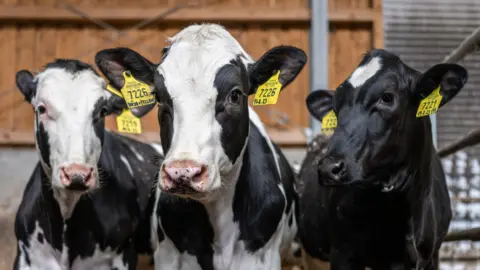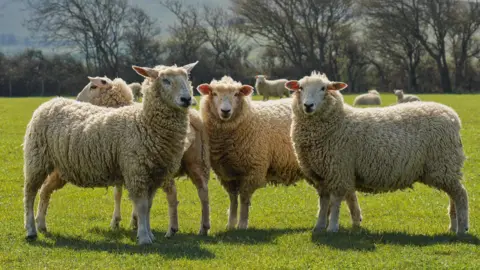Bluetongue travel restrictions on cattle to be lifted
 Getty Images
Getty ImagesBluetongue restrictions on transporting livestock between Wales and England will be completely lifted on November 10, the Welsh government has announced.
Spread by midges, bluetongue poses no threat to the public or food safety but can have serious consequences for cloven hoofed animals like sheep and cattle.
Farmers have faced restrictions for months, and some restrictions eased in August to allow vaccinated livestock to be taken to markets within 12 miles (20km) of the Welsh border.
There have been 11 confirmed cases of the disease so far - four in Powys and seven in the temporary control zone in Monmouthshire, according to the Welsh government.
As of 1 July, England became a bluetongue restricted zone, which meant that livestock within the country could move freely, but to move them across the border meant farmers had to test each animal, at a cost of about £70 - which impacted agricultural shows.
Now the Welsh government has issued a nationwide restricted zone, allowing cross-border movement.
Wales' deputy first minister for climate change and rural affairs, Huw Irranca-Davies, said it will be implemented on 10 November because by that date "historic temperature data and modelling work indicates it is very unlikely for midge-borne transmission of Bluetongue virus to occur".
What is bluetongue?
Bluetongue affects cattle, goats, sheep, deer and camelids such as llamas and alpacas.
It can cause ulcers or sores around the animal's mouth and face, difficulties swallowing and breathing, fever and lameness, foetal deformities and stillbirths.
Spread by midges, bluetongue poses no threat to humans or food safety but can have serious consequences for livestock.
The latest outbreak began in the Netherlands in 2023, where tens of thousands of sheep died, and midges blown over from the continent began infecting livestock in the south-east of England too.
But the impact of bluetongue vaccination BTV-3 seems to vary considerably across different regions, with some animals showing little sign of infection and managing to recover.
 Getty Images
Getty ImagesThe Welsh government said this zone only relates to this specific type of bluetongue, and controls may need to be introduced for positive cases of new bluetongue strains, should these emerge in the future.
Irranca-Davies said he appreciated the restrictions on livestock movements and the introduction of a temporary control zone has been "disruptive for livestock keepers and wider industry".
Richard Irvine, Wales' chief veterinary officer, said animal keepers should continue to "source stock responsibly, remain vigilant for the signs of bluetongue" and to report any suspect cases immediately.
"Vaccination remains the best way to protect livestock and livelihoods from the worst impacts of bluetongue, which can include both illness of affected livestock and longer-term effects on fertility and productivity," he said.
Andrew RT Davies, Welsh conservative MS, said: "The virus is spread by midges flying through the air, and the idea they would respect borders was always laughable.
"While I welcome that the restrictions will be lifted, this doomed policy has done significant damage to an industry dependent on cross-border trade."
What does this mean for farmers?
- The temporary control zones are cancelled
- Individual premises which have previously had bluetongue-specific controls on them will have these removed
- Infected animals will not be culled
- Livestock can move freely between England and Wales
- Monitoring for new bluetongue types will continue
- Germinal products, semen, egg cells and embryos, will still be restricted - donor animals must be tested
- Moving livestock to Scotland will be subject to the Scottish government's rules
